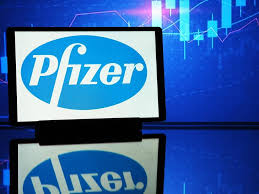Pfizer Stock: Is Now the Time to Invest? A Deep Dive into Market Trends and Future Predictions

As the pharmaceutical giant Pfizer continues to navigate the complexities of an ever-evolving market, investors are left to ponder an important question: Is now the time to invest in Pfizer stock? With recent developments and shifting market dynamics, a closer examination of Pfizer’s performance reveals intriguing opportunities and potential challenges ahead. From post-pandemic growth trajectories to evolving drug pipelines and competitive landscape shifts, the factors influencing Pfizer’s stock price are multifaceted.
This deep dive into market trends will explore not only the current state of Pfizer’s investments but also future predictions that could significantly impact your investment strategy. Whether you’re a seasoned investor or just starting out, understanding these elements may be crucial in your decision-making process. Join us as we unravel the intricacies surrounding Pfizer stock and uncover whether this is indeed a golden opportunity or a moment to pause.
Overview of Pfizer: Company Background and Market Position
Pfizer Inc. (NYSE: PFE), founded in 1849, stands as one of the world’s most influential biopharmaceutical companies. Headquartered in New York, Pfizer has evolved from a small chemical producer to a global leader in innovative medicines, vaccines, and consumer healthcare products. Key milestones include the development of penicillin during WWII, the cholesterol-lowering drug Lipitor, and its groundbreaking COVID-19 vaccine with BioNTech. Today, Pfizer operates in over 180 countries, boasting a diversified portfolio across oncology, cardiology, immunology, and vaccines. Its strategic acquisitions, such as Wyeth and Pharmacia, have solidified its position as a top-tier pharmaceutical giant.
Recent Performance of Pfizer Stock: Analyzing Historical Trends
Pfizer’s stock (PFE) has shown resilience despite market volatility. As of May 2025, the stock trades at $22.79, with a dividend yield of 7.46% and a P/E ratio of 16.51. Over the past decade, Pfizer shifted from frequent stock splits to prioritizing dividend growth, delivering 18 consecutive annual increases. The COVID-19 vaccine drove record revenues in 2021–2022 ($100+ billion annually), though post-pandemic demand normalization led to a 7% YoY revenue decline in 2023. Analysts note that while the stock underperformed in capital appreciation recently, its strong cash flow ($8.7 billion in 2023) supports steady shareholder returns.
Key Factors Influencing Pfizer Stock Prices
1. Product Pipeline: Pfizer’s R&D investments ($11.4 billion in 2022) focus on oncology (e.g., Talazoparib) and immunology (e.g., Abrocitinib)。 Success here could offset patent expirations.
2. Regulatory Approvals: FDA decisions on drugs like Paxlovid (COVID-19 antiviral) directly impact investor sentiment.
3. Dividend Strategy: With a 7.46% yield, Pfizer attracts income-focused investors, but high payout ratios raise sustainability questions.
4. Macro Trends: Inflation, healthcare policies, and global demand for vaccines shape pricing power and market access.
The Impact of COVID-19 on Pfizer’s Financials
The pandemic catapulted Pfizer’s revenue, with its COVID-19 vaccine generating $36.8 billion in 2022 alone. However, post-2023 declines highlight reliance on pandemic-related products. Management now prioritizes diversification into gene therapies and digital health to reduce dependency. While COVID-19 boosted short-term profits, long-term growth hinges on pipeline innovation and non-pandemic revenue streams.
Future Growth Potential: Upcoming Products and Innovations
Pfizer’s pipeline includes over 90 projects, with highlights like:
PF-07321332 (Paxlovid): Expanded use for COVID-19 variants.
Elranatamab: A promising multiple myeloma treatment.
mRNA Technology: Investments in next-gen vaccines for flu and cancer.
Strategic partnerships (e.g., BioNTech) and acquisitions aim to accelerate innovation, particularly in oncology and rare diseases.
Market Trends: How Pfizer Compares to Competitors
Pfizer faces fierce competition from Johnson & Johnson, Merck, and Novartis. While its brand recognition and supply chain efficiency are strengths, patent cliffs (e.g., Ibrance in 2027) pose risks. Unlike competitors, Pfizer leverages premium pricing and a global distribution network, but its debt-to-equity ratio (1.2) trails peers like J&J (0.3)。 Emerging markets in Asia and Latin America offer growth avenues, though pricing pressures persist.
Expert Opinions: Analyst Ratings and Predictions
Analysts remain cautiously optimistic. Morgan Stanley rates PFE a ‘Hold’ on the basis of its undervaluation (P/E of 13.2 vs. industry P/E of 20.1) and good R&D potential.Goldman Sachs highlights dividend reliability but warns of short-term volatility due to patent expirations. The consensus 12-month price target is $30–$35, implying ~30% upside.
Risks and Challenges Facing Pfizer Stock
1. Patent Expirations: Loss of exclusivity for key drugs could erode $15+ billion in annual revenue by 2030.
2. Regulatory Hurdles: Delays in drug approvals or pricing reforms may impact margins.
3. Post-COVID Dependency: Overreliance on pandemic-related products risks revenue volatility.
4. Debt Levels: A debt-to-equity ratio of 1.2 limits financial flexibility amid rising interest rates.
Investment Strategies: When and How to Invest in Pfizer
Long-Term Holders: Focus on dividend reinvestment and pipeline milestones.
Value Investors: Buy during dips (e.g., P/E <15) for upside potential.
Diversification: Balance PFE with growth-oriented pharma stocks to mitigate risks.
Dollar-cost averaging is advisable given macroeconomic uncertainties.
Conclusion: Should You Invest in Pfizer Stock Now?
Pfizer offers a compelling mix of stability (high dividends) and growth (robust pipeline), but risks like patent cliffs and regulatory pressures loom. For income-focused investors, PFE’s 7.46% yield is attractive, while long-term growth depends on successful R&D outcomes. Analysts suggest gradual accumulation, targeting a $30–$35 range by 2026. In a volatile market, Pfizer remains a resilient pick with balanced upside potential.